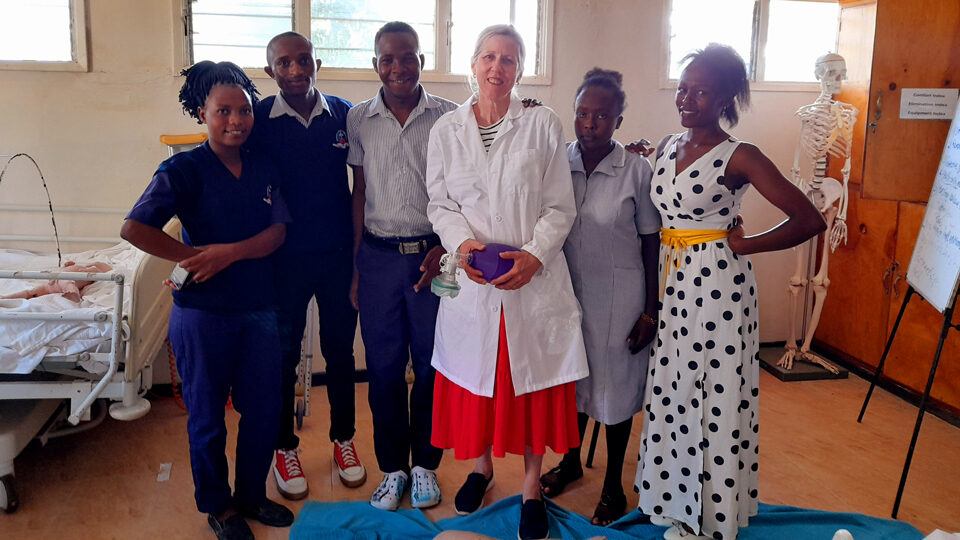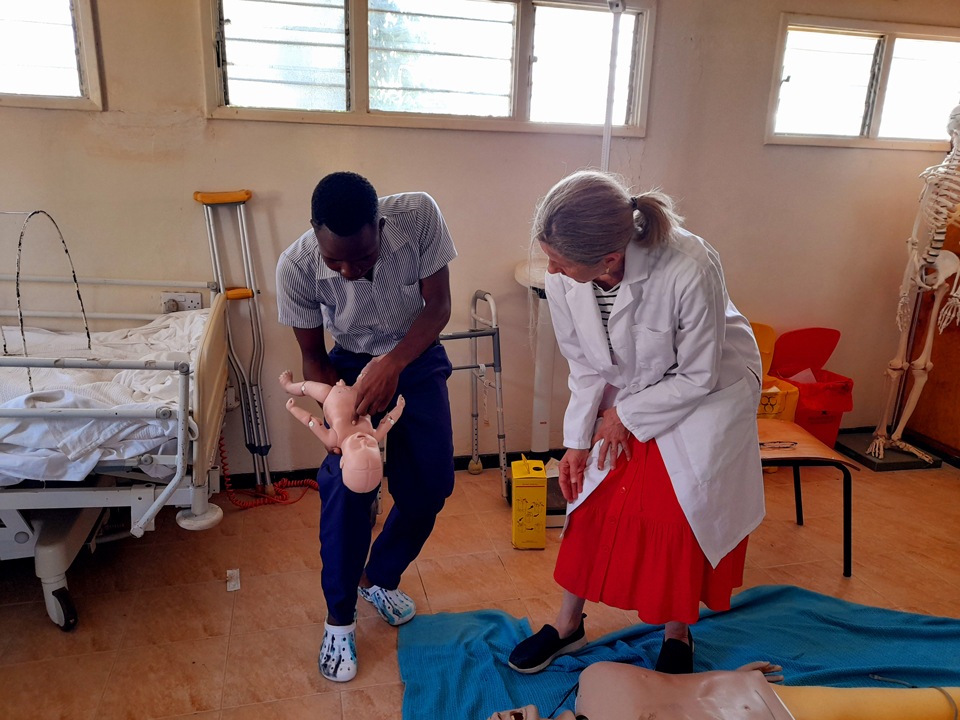Volunteer Recognition Day — An Interview with Susan Stringham, Nurse Educator in Kenya

Volunteer Recognition Day is on April 20. It is a day to celebrate and honor those who selflessly serve others in need.
This year, CMMB had a chance to interview Susan Stringham. Susan is a registered nurse with over 30 years of experience, and a CMMB volunteer currently serving in rural Kenya at Mutomo Mission Hospital with CMMB Kenya. Susan is building local capacity at health facilities by teaching the gold standard in care to the next generation of nurses and healthcare workers.
She volunteers as a nurse educator and teaches students skills in Accidents and Emergencies (A&E). These courses include CPR and First Aid, and students earn a certificate upon completion of her course. As a medical volunteer, Susan puts her faith into action. “I feel like serving others is helping the Lord live through my work. I’m trying to do that in my own way,” said Susan.
Read more of our interview with Susan Stringham below.
Can you share some of the major health challenges communities in rural Kenya face?
The issues with emergency care in Africa are so very deep. I’m teaching emergency care and first aid skills. When my students are out in the community and they have a mom who is bleeding or having pre-term problems, they are going to have the training to get the mother the help she needs.
The number one and two reasons that babies die here is pneumonia and cord sepsis. Cord sepsis means that after the baby’s born, the cord may become infected with streptococcus or something else. This really speaks to an infection control problem—not having stringent practices in terms of cleaning things. An issue is something called nosocomial infection, which means a hospital induced infection. That’s very worrisome.
“The issues with emergency care in Africa are so very deep.”
In terms of maternal and child health, some of the moms get to the hospital too late. They wait too long. When they get here, then you have maternal complications. I don’t know that you really see that many deaths here with the moms. It’s the babies—it’s the babies that die or they are born stillborn.
What are some ways CMMB Kenya is working to improve maternal and child health?
Community health workers play an important role. They go through a curriculum that includes maternal and child health. It’s part of the UNICEF and World Health Organization standards. Mothers are recommended at least four antenatal care visits, but we want mothers to have eight. I know community health workers work hard to teach women about how important those visits are.
I think that CMMB is admired and hailed here for the work that they do. The people at the hospital say about CMMB, “They do their work quietly. They don’t bother anybody. They just do an immense amount of work here.”
“There’s so much work to do in Africa, but you can see the progress.”
There’s so much work to do in Africa, but you can see the progress. You can see what’s being done here, especially in maternal and child health. People here see that. The long-term impact of CMMB — and the focus — makes a difference in this area for many people.
Can you share about the CPR course you are teaching and your students?
The students are really hungry for this information—really, really hungry for it. For all nursing students and healthcare workers, this is a requirement. They need to know CPR. I brought over here the Red Cross adult CPR, child CPR, and infant choking AED course.

CMMB volunteer and nurse educator Susan Stringham with a student during a CPR training in rural Kenya in April 2022.
I’m very skilled in CPR. I’ve performed CPR. I teach them the gold standard of CPR skills. I work them hard. I push them. I really try to make sure that they understand how you do quality CPR skills and what happens if a mother or a pregnant woman is choking—to know what what happens if a pregnant mother needs CPR.
For the first aid part of the course, it really begins with answering what do with a sudden illness. People that may be diabetic or experience heart attacks, respiratory difficulties, asthma attacks, or anaphylaxis. What do you do with people that are in the bush that have a snake bite? That’s a very serious problem here. There are very poisonous snakes here. I saw my first one last week. It was a green mamba, and it was in one of the classrooms in the rafter.
Are there other CMMB Kenya projects that you’ve found notable?
Another area that CMMB is very strong in is water projects. CMMB Kenya has done a huge amount in this area. It has been the rainy season, but we really haven’t gotten much rain. There’s a drought in Kenya, but CMMB has put up all these big black tanks that have really done a lot to help store water—to have 14-months of water stored.
When they go through a drought, there is at least water for the hospital, which impacts the healthcare. They have enough water for hand washing and cleaning.
Are there any scriptures or prayers that have guided you during your field work so far?
“But seek first his kingdom and his righteousness, and all these things will be given to you as well.” —Matthew 6:33
My own personal practice is that the first thing I do every morning is put God first. I talk to him. I say, “I need you today. What’s my assignment? Who is it that you particularly need for me to serve today? Is it one individual? Is it a group of them?”
That’s the first thing I do when I wake up in the morning.
Can you share about what role your faith plays and how it impacts your work? Especially as a member of the Church of Latter-Day Saints.
I feel like serving others is helping the Lord live through my work. I’m trying to do that in my own way. It’s really about trying to fulfill the mission that the Savior taught us of helping the poor and those who are infirm. It’s why I do this work.
“I feel like serving others is helping the Lord live through my work.”
I think that when God puts dreams in us, those dreams come from love. He gives those to us and helps us to fulfill them because I think that’s what he needs us to do. I think that’s what dreams are about. He gives them to us. I’m living the dream.